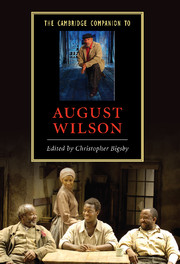Book contents
- Frontmatter
- 1 August Wilson: the ground on which he stood
- 2 Been here and gone
- 3 August Wilson’s relationship to black theatre: community, aesthetics, history and race
- 4 Music and mythology in August Wilson’s plays
- 5 Gem of the Ocean and the redemptive power of history
- 6 Joe Turner’s Come and Gone
- 7 Ma Rainey’s Black Bottom: cutting the historical record, dramatizing a blues CD
- 8 A piano and its history: family and transcending family
- 9 The tragedy of Seven Guitars
- 10 Safe at home?: August Wilson’s Fences
- 11 Two Trains Running: blood on the tracks
- 12 Jitney, folklore and responsibility
- 13 King Hedley II: in the midst of all this death
- 14 Radio Golf: the courage of his convictions - survival, success and spirituality
- 15 Critics on August Wilson
- 16 An interview with August Wilson
- Index
11 - Two Trains Running: blood on the tracks
Published online by Cambridge University Press: 28 January 2008
- Frontmatter
- 1 August Wilson: the ground on which he stood
- 2 Been here and gone
- 3 August Wilson’s relationship to black theatre: community, aesthetics, history and race
- 4 Music and mythology in August Wilson’s plays
- 5 Gem of the Ocean and the redemptive power of history
- 6 Joe Turner’s Come and Gone
- 7 Ma Rainey’s Black Bottom: cutting the historical record, dramatizing a blues CD
- 8 A piano and its history: family and transcending family
- 9 The tragedy of Seven Guitars
- 10 Safe at home?: August Wilson’s Fences
- 11 Two Trains Running: blood on the tracks
- 12 Jitney, folklore and responsibility
- 13 King Hedley II: in the midst of all this death
- 14 Radio Golf: the courage of his convictions - survival, success and spirituality
- 15 Critics on August Wilson
- 16 An interview with August Wilson
- Index
Summary
The 1960s were always going to present August Wilson with a particular challenge in his grand scheme to create a decade-by-decade reflection on African American experience in the twentieth century. As Wilson himself remarks in the prefatory notes for his 1950s play Fences (1985), the 'hot winds of change' that began to gather in the postwar era 'would make the sixties a turbulent, racing, dangerous and provocative decade'. The civil rights movement, which began in earnest with the Montgomery, Alabama, bus boycott of 1955 - after Rosa Parks refused to give up her seat to a white man - used peaceful tactics of mass civil disobedience to challenge and shame the often brutally repressive regimes maintained by segregationist cities and states in the American South. By the early 1960s, though, Malcolm X's calls, from the pulpits of the Nation of Islam, for black self-determination 'by any means necessary' had begun to rally support for a more aggressively defiant, anti-assimilationist stance. Although Malcolm X was assassinated in 1965, his spirit remained very much alive in figures such as Stokely Carmichael, who in 1966 challenged Martin Luther King for the moral high ground within his own civil rights movement, invoking the term 'Black Power': 'Power is the only thing respected in this world, and we must get it at any cost.' That same year, the first chapter of the Black Panther Party was formed in California, availing itself of the constitutional right to bear arms in presenting itself as the first fully-fledged black revolutionary organization.
- Type
- Chapter
- Information
- The Cambridge Companion to August Wilson , pp. 145 - 157Publisher: Cambridge University PressPrint publication year: 2007
- 1
- Cited by

